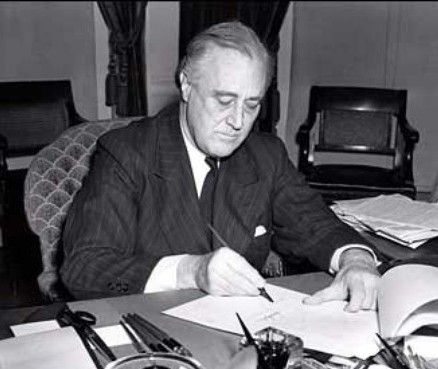When Elephants and Donkeys Fought over Turkey

In late 1621, about four or five dozen Pilgrims — settlers in the New World from England — and roughly 90 Native Americans celebrated the settlers’ first successful harvest in North America. The feast lasted three days and, yes, involved large amounts of turkey. It took well over two centuries, but today, we in the United States consider this feast to be the “First Thanksgiving,” the traditional basis for the annual holiday observed on the fourth Thursday in November. It is a time for Americans to celebrate whatever good fortune the year prior has brought, setting aside differences and coming together as families and communities . . . and watch a little football, too.
Except from 1939 to 1941. For those years, the holiday was a political football, and more divisive than appropriate given the type of holiday.
Thanksgiving wasn’t a regular holiday until 1863. The first official national day of thanks was November 26, 1789, created by proclamation by President George Washington about seven weeks earlier, but the tradition did not set in — he wouldn’t declare another national thanksgiving until 1795. John Adams, his successor, declared such holidays in 1798 and 1799, but the next president, Thomas Jefferson, declined to follow suit. But over the first half of the 19th century, various presidents and state governments instituted similar holidays, some annually, others ad hoc. During the Civil War, Abraham Lincoln made Thanksgiving an annual national tradition, proclaiming the last Thursday of November as the holiday we Americans now celebrate each year.
Thanksgiving remained on that day for roughly 75 years. But in 1939, with the nation mired in the Great Depression, then-President Franklin Delano Roosevelt decided to change it. At the time it was unseemly to start with holiday-themed advertising about Christmas before Thanksgiving (and many Americans still find “Christmas creep” unsettling), and this proved to be a significant problem that year. November 1st was a Wednesday, making November 30th a Thursday — the fifth Thursday of the month. At the urging of Federated Department Stores (now Macy’s) founder Fred Lazarus, Roosevelt declared that the fourth Thursday of the month — November 23rd — would be Thanksgiving.
Republicans flipped, seeing the move as a slap in the face of Lincoln’s legacy. Alf Landon, who FDR handily defeated in the 1936 Presidential election, called the move confusing, impulsive, and meritless, and likened Roosevelt’s decision to make the move hastily and unilaterally to something Hitler would do, according to Wikipedia. A Gallup survey found that 72% of Republicans with an opinion on the issue disapproved of the plan, while a slight majority of Democrats (52% to 48%) favored it. Some started to call November 30th the “Republican Thanksgiving” and the 23rd the “Democratic Thanksgiving” or “Franksgiving,” the latter a tongue-in-cheek portmanteau of “Franklin” and “Thanksgiving.”
But as we know today, FDR got the last laugh — kind of. In 1940 and 1941, he declared that the holiday be celebrated on the third Thursday in November, which prompted further protests and ultimately, Congressional action. In October of 1941, Congress passed a bill restoring Thanksgiving to its original (as in 1863) status as the last Thursday in November, but FDR did not sign that bill into law. In December, the Senate, by way of compromise, amended the bill so that the holiday was, officially, on the fourth Thursday of the month. The House accepted the amendment and Roosevelt signed it into law on December 26th of that year.
Bonus fact: By most accounts, Alf Landon’s 1936 campaign against FDR was a disaster. For example, he apparently did not make a single campaign appearance for the first two months after securing the Republican nomination for President. At one point, the dearth of appearances became news in its own right, with a columnist taking a shot at his absence: “Considerable mystery surrounds the disappearance of Alfred M. Landon of Topeka, Kansas…. The Missing Persons Bureau has sent out an alarm bulletin bearing Mr. Landon’s photograph and other particulars, and anyone having information of his whereabouts is asked to communicate direct with the Republican National Committee.”
From the Archives: How Turkey Got Its Name: Why is a bird native to North America named after a country in Europe/Asia?
Related: A box of Thanksgiving questions, geared toward 6 to 10 year-olds. Designed to “keep everyone engaged, and around the table, while sharing this family experience and making happy holiday memories.”
